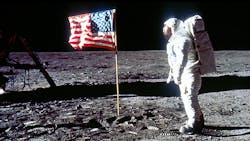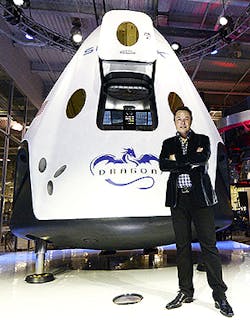After four years hitching rides with Russia to space, the American space program is officially back in business.
Yesterday, NASA announced two new, gigantic contracts with Boeing (IW 500/13) and SpaceX to begin transporting U.S. astronauts back into orbit.
If all goes to plan, this means our dependence on Russian rockets and our hiatus from the space age will end in just three years.
"From day one, the Obama Administration made clear that the greatest nation on Earth should not be dependent on other nations to get into space," NASA Administrator Charlie Bolden told crowds at the agency's Kennedy Space Center in Florida.
"Thanks to the leadership of President Obama, the hard work of our NASA and industry teams, and support from Congress, today we are one step closer to launching our astronauts from U.S. soil on American spacecraft and ending the nation’s sole reliance on Russia by 2017," he said. "Turning over low-Earth orbit transportation to private industry will also allow NASA to focus on an even more ambitious mission – sending humans to Mars."
The deal awards Boeing $4.2 billion and SpaceX – which has been transporting supplies to the International Space Station since 2012 – another $2.6 billion for as many as six crewed missions to the space station each over the life of the contracts.
This announcement comes as great news for the science community and for space enthusiasts, of course, but it also signifies a new, exciting era for American manufacturing.
Over the last two years, beginning with America Makes (NAMII) and the National Network for Manufacturing Innovation centers that have been popping up across the U.S., the government has been dabbling in public-private partnerships – dolling out funds usually reserved for tightly secured government R&D to promote collaboration and open innovation across industries.
This new deal expands that plan to a galactic scale.
Space and American Manufacturing
For 50 years, space has been a government affair, relying on tax dollars to advance our reach into the final frontier – a mission constantly stymied by budget cuts, political maneuvers and waning public interest.
But this announcement marks the beginning of something new.
For just $6.8 billion, private companies, designing their own technologies and manufacturing their own equipment, will now drive the next generation of explorers to space.
That means, in addition to the loftier, "giant leap for mankind" sentiments of space travel, American workers, American innovation and, most of all, American manufacturing will all finally profit from the endeavor.
For the space exploration naysayers in the crowd arguing that NASA and its trillion-dollar budgets are a waste of public dollars, this deal changes the whole discussion.
"We are excited to see our industry partners close in on operational flights to the International Space Station, an extraordinary feat industry and the NASA family began just four years ago," Kathy Lueders, manager of NASA's Commercial Crew Program, said in the announcement.
"This space agency has long been a technology innovator, and now we also can say we are an American business innovator, spurring job creation and opening up new markets to the private sector."
About the Author
Travis M. Hessman
Editor-in-Chief
Travis Hessman is the editor-in-chief and senior content director for IndustryWeek and New Equipment Digest. He began his career as an intern at IndustryWeek in 2001 and later served as IW's technology and innovation editor. Today, he combines his experience as an educator, a writer, and a journalist to help address some of the most significant challenges in the manufacturing industry, with a particular focus on leadership, training, and the technologies of smart manufacturing.

